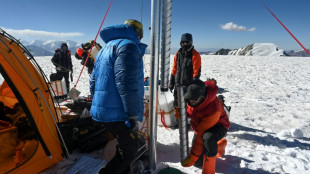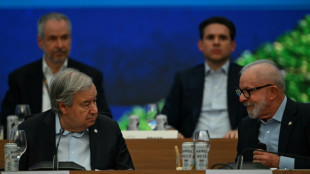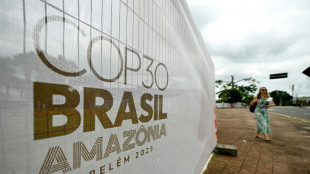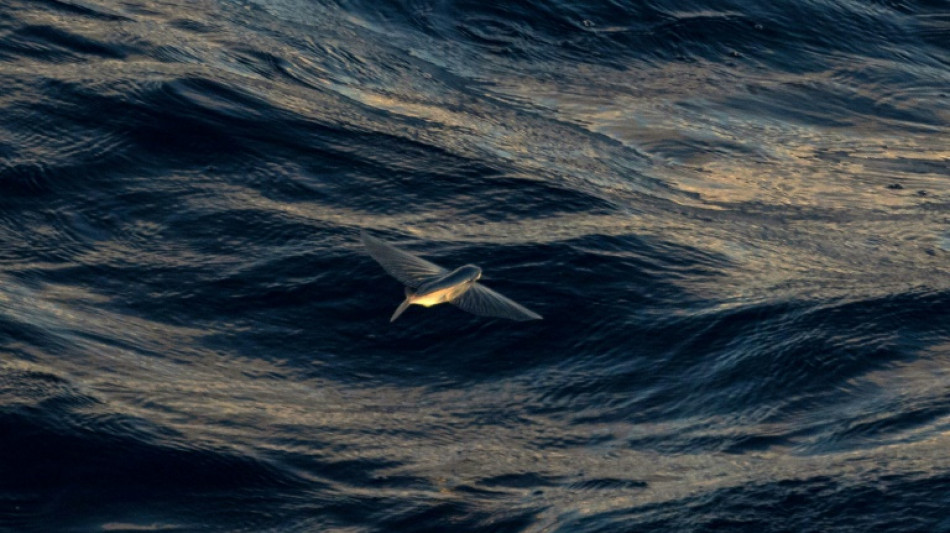
-
 Scandic Trust Group strengthens sales network with First Idea Consultant
Scandic Trust Group strengthens sales network with First Idea Consultant
-
Frank says Spurs supporting Udogie through 'terrible situation'

-
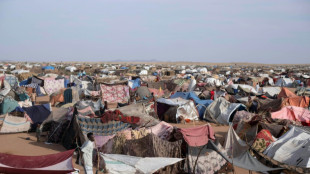 MSF warns of missing civilians in Sudan's El-Fasher
MSF warns of missing civilians in Sudan's El-Fasher
-
Norris on top as McLaren dominate opening Sao Paulo practice

-
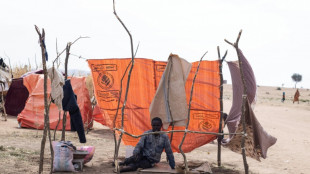 UN warns 'intensified hostilities' ahead in Sudan despite RSF backing truce plan
UN warns 'intensified hostilities' ahead in Sudan despite RSF backing truce plan
-
Seven hospitalized after suspicious package opened at US base

-
 Guardiola says 'numbers are insane' as he reaches 1,000 games in charge
Guardiola says 'numbers are insane' as he reaches 1,000 games in charge
-
Brazil welcomes China lift of ban on poultry imports

-
 Scotland captain Tuipulotu bids for landmark win over All Blacks
Scotland captain Tuipulotu bids for landmark win over All Blacks
-
Woman convicted in UK of harassing Maddie McCann's parents

-
 Tanzania charges more than 100 with treason over election protests
Tanzania charges more than 100 with treason over election protests
-
Nexperia chip exports resuming: German auto supplier

-
 Genge warns England to beware 'nasty' Fiji at Twickenham
Genge warns England to beware 'nasty' Fiji at Twickenham
-
Stocks fall on renewed AI bubble fears

-
 UK grandmother on Indonesia death row arrives back in London
UK grandmother on Indonesia death row arrives back in London
-
Spanish star Rosalia reaches for divine in new album

-
 Portugal's Mendes out injured as Neves returns for World Cup qualifiers
Portugal's Mendes out injured as Neves returns for World Cup qualifiers
-
Afghan-Pakistan peace talks push ahead after border clashes

-
 Fleetwood in tie for lead at halfway stage in Abu Dhabi
Fleetwood in tie for lead at halfway stage in Abu Dhabi
-
Brazil court starts hearing Bolsonaro appeal

-
 Serbia fast-tracks army HQ demolition for Trump family hotel
Serbia fast-tracks army HQ demolition for Trump family hotel
-
Ireland captain Doris 'mentally stronger' after long break

-
 MSF accuses powerful nations of weakening S.Africa's G20 health text
MSF accuses powerful nations of weakening S.Africa's G20 health text
-
Maresca defends Chelsea rotation policy after Rooney criticism

-
 Hundreds of flights cut across US in government paralysis
Hundreds of flights cut across US in government paralysis
-
Xhaka 'made me a better coach', says Arsenal boss Arteta

-
 Central Nigerian town rebuilds religious trust in shadow of Trump's threat
Central Nigerian town rebuilds religious trust in shadow of Trump's threat
-
Inside Germany's rare earth treasure chest

-
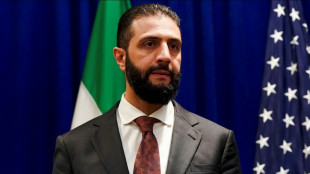 Former jihadist Syrian leader makes unprecedented White House visit
Former jihadist Syrian leader makes unprecedented White House visit
-
Kagiyama takes NHK lead in Japan to kick-start Olympic season

-
 Ikea profits drop on lower prices, tariff costs
Ikea profits drop on lower prices, tariff costs
-
European, Asian stocks decline after Wall Street slide
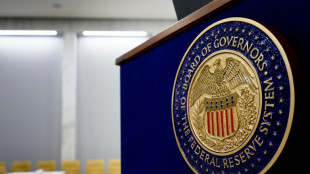
-
 Tuchel brings 'immense' Bellingham and Foden back into England fold
Tuchel brings 'immense' Bellingham and Foden back into England fold
-
German FA extends with president Neuendorf until 2029

-
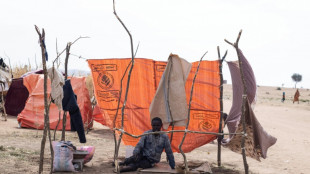 No end to Sudan fighting despite RSF paramilitaries backing truce plan
No end to Sudan fighting despite RSF paramilitaries backing truce plan
-
US officials, NGOs cry foul as Washington snubs UN rights review
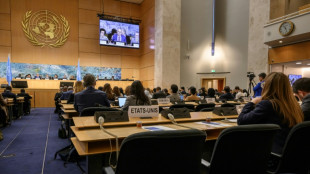
-
 Injured teen medal hope Tabanelli risks missing home Winter Olympics
Injured teen medal hope Tabanelli risks missing home Winter Olympics
-
Bellingham, Foden recalled to England squad for World Cup qualifiers

-
 Tanzania rights group condemns 'reprisal killings' of civilians
Tanzania rights group condemns 'reprisal killings' of civilians
-
Slot urges patience as Isak returns to training with Liverpool

-
 Rees-Zammit set for Wales return with bench role against Argentina
Rees-Zammit set for Wales return with bench role against Argentina
-
China's new aircraft carrier enters service in key move to modernise fleet

-
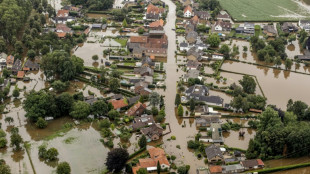 Operation Cloudburst: Dutch train for 'water bomb' floods
Operation Cloudburst: Dutch train for 'water bomb' floods
-
Leaders turn up the heat on fossil fuels at Amazon climate summit
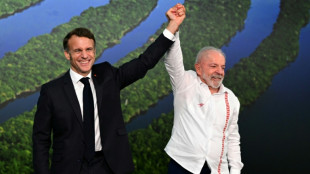
-
 US travel woes mount as govt shutdown prompts flight cuts
US travel woes mount as govt shutdown prompts flight cuts
-
North Korea fires unidentified ballistic missile: Seoul military

-
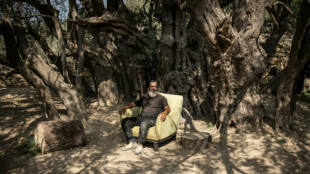 West Bank's ancient olive tree a 'symbol of Palestinian endurance'
West Bank's ancient olive tree a 'symbol of Palestinian endurance'
-
Global tech tensions overshadow Web Summit's AI and robots

-
 Green shines as Suns thump Clippers 115-102
Green shines as Suns thump Clippers 115-102
-
Japan to screen #MeToo film months after Oscar nomination

| RYCEF | -1.21% | 14.82 | $ | |
| CMSC | -0.17% | 23.74 | $ | |
| RBGPF | 0% | 76 | $ | |
| VOD | 1.95% | 11.566 | $ | |
| NGG | 0.95% | 77.02 | $ | |
| SCS | 0.13% | 15.78 | $ | |
| GSK | -0.82% | 46.715 | $ | |
| RIO | -0.95% | 68.62 | $ | |
| BTI | 0.36% | 54.405 | $ | |
| AZN | 0.99% | 84.605 | $ | |
| CMSD | -0.37% | 23.922 | $ | |
| RELX | -2.55% | 42.31 | $ | |
| BCE | -0.13% | 23.14 | $ | |
| BCC | 0.31% | 70.95 | $ | |
| BP | 0.93% | 36.155 | $ | |
| JRI | -0.62% | 13.665 | $ |

What will the UN high seas treaty mean for protecting the ocean?
The world's first international treaty on the high seas, set to be adopted by the United Nations on Monday, contains landmark tools for the conservation and management of international waters.
International waters -- outside the jurisdiction of any single state -- cover more than 60 percent of the world's oceans.
Ocean ecosystems create half the oxygen humans breathe and limit global warming by absorbing much of the carbon dioxide emitted by human activities.
Once adopted, the UN treaty will go into force 120 days after 60 countries have ratified it.
Here are the key points of the text approved in March. The final version to be voted on has not yet been published.
- Ocean under threat -
The treaty begins by recognizing "the need to address, in a coherent and cooperative manner, biodiversity loss and degradation of ecosystems of the ocean."
These impacts include the warming of ocean waters along with their loss of oxygen, acidification, mounting plastics and other pollutants, as well as overfishing.
The text specifies that it will apply to waters beyond countries' exclusive economic zones, which extend to a maximum of 200 nautical miles from the coasts.
It also covers what is known as "the Area", shorthand for seabed and subsoil beyond the limits of national jurisdiction. The Area comprises just over half of the planet's seabed.
The Conference of the Parties (COP) will have to navigate the authority of other regional and global organizations.
Chief among these are regional fisheries bodies and the International Seabed Authority, which oversees permits for deep-sea mining exploration in some areas and may soon make the controversial move of allowing companies to mine beyond current test runs.
- Marine protected areas -
Currently, almost all protected marine areas (MPAs) are within national territorial waters.
The treaty, however, allows for these reserves to be created in the open ocean.
Most decisions would be taken by a consensus of the COP, but an MPA can be voted into existence with a three-quarters majority, to prevent deadlock caused by a single country.
One crucial shortcoming: the text does not say how these conservation measures will be monitored and enforced over remote swathes of the ocean -- a task that will fall to the COP.
Some experts say satellites could be used to spot infractions.
Individual countries are already responsible for certain activities on the high seas that they have jurisdiction over, such as those of ships flying their flags.
- Sharing the bounty? -
On the high seas, countries and entities under their jurisdiction will be allowed to collect animal, plant, or microbial matter whose genetic material might prove useful, even commercially.
Scientists, for example, have discovered molecules with the potential to treat cancer or other diseases in microbes scooped up in sediment, or produced by sponges or marine mollusks.
Benefits-sharing of those resources has been a key point of contention between wealthy and poorer nations.
The treaty establishes frameworks for the transfer of marine research technologies to developing countries and a strengthening of their research capacities, as well as open access to data.
But it's left to the COP to decide exactly how any monetary benefits will eventually be shared, with options including a system based on specific commercialized products, or more generalized payment systems.
- Environmental impact studies -
The treaty requires signatories to assess the environmental impacts of planned activities under their control on the high seas before they are authorized in instances when such activities may have more than a minor or transitory effect.
It also calls for countries to assess the potential impact on international waters of activities within national jurisdictions that may cause "substantial pollution" or harm the high sea marine environment.
Ultimately, states are responsible for giving the green light to any potentially harmful activity -- a role NGOs hoped would go to the COP, to make controversial approvals more difficult.
The treaty also requires states to publish updates on an activity's environmental impacts. Approvals can be called into question if unanticipated impacts arise.
Though they are not specifically listed in the treaty, activities that could come under regulation include transport and fishing, as well as more controversial subjects such as deep-sea mining or even geo-engineering initiatives to mitigate global warming.
B.AbuZeid--SF-PST

